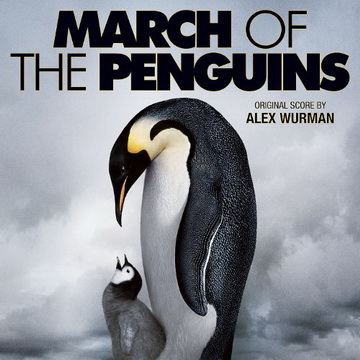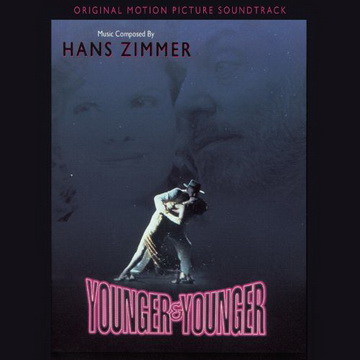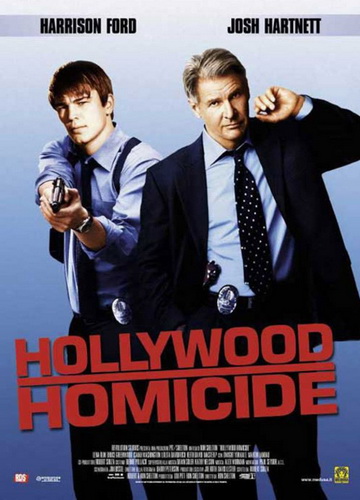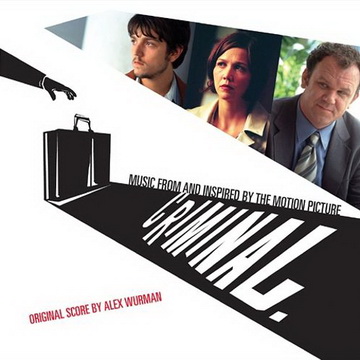Wild life documentaries are rarely blockbusters. The March of the Penguins belongs to this elite group as it conquers the cinemas around the world and it's "actors" do the same with the heart of the audience. The march of the tuxedo-wearing birds is accompanied by two composers. We had the possibility to interview the composer of the American edition. Alex Wurman spoke not only about the Antarctica assignment but about the previous works of his career as well.
Our first question relates to your music composed to the recently released nature movie, the March of the Penguins. When and by whom were you asked for this job?
I just had a chance meeting with Mark Gill, the head of Warner Brothers Independent Pictures. They needed to hire somebody. He knew of my work on a few interesting projects and offered this one to me on a hunch. I watched it and loved it. I came into the process about 2-3 weeks before they finalized the deal with the French – so it wasn't certain that it was going to work out. But if it was going to work out, the clock was already ticking. Even before they're deal was finalized, I started working on it, and in total spent about six weeks writing, recording and mixing the music.
 What sort of research did you make before starting the work? And how does the fact, that you were composing a music for a movie which doesnt have its own music culture, make your work difficult?
What sort of research did you make before starting the work? And how does the fact, that you were composing a music for a movie which doesnt have its own music culture, make your work difficult? It didn't make it difficult at all. In fact, it made it easier. Not only did we approach the film from a human standpoint, but I also approached the music from that standpoint. In fact, in this case, it was easier because I was responding to what I was seeing without the parameters associated with an area's own music culture, I was able to write what I was feeling.
How long did you search for the suitable moods and tunes? How many weeks did you spend with composing the music?
I finished the project in a little more than six weeks and I searched for the ideas for a little more than two weeks.
How long were the recordings and the afterworks? In which studio did they take place? Which software did you use mixing the recorded material?
I recorded for about a week and did sessions at my home. I did one string date at Warner Bros. I lived in my studio for about a week after that. I used Logic Audio to write the music and ProTools to record the live instruments.
The movie is an American / French coproduction and this phenomenon is present in the persons of the composers as well. You were assembling the music of the American edition while in the rest of the world people may enjoy the more alternative tunes of Emilie Simon. Was this pre-planned or the decision was made during the shots? What was the reason behind this duality?
I did not work with the French crew, but I have an idea about the American company. The idea was to broaden the film for an American audience.
Did you meet Emilie Simon or have a regular contact with her? Did you work together on certain issues, common points?
No. I worked directly with Warner Independent and National Geographic who bought the French version at Sundance but they wanted to redo the elements. Collaborating with Jordan Roberts (who wrote the script), Mark Gill, Tracy Bing (WIP), and Adam Leipzig (NG) was a pleasure. In fact, there was something cool about being in contact with the studio heads directly throughout the project.
Due to the big success of the movie have you received any new offers which help your future career?
Not yet, but I have already received a lot of response.
Since the movie relates to the animal world, the question is inevitable: do you have any pet? Have you been touched by the world of the penguins during the works?
I was touched by the penguins while watching them and am fascinated by penguins now. I have two dogs even though I am a cat person – but no pet penguin.
 Let's do some travel back in time. At the start of your career – in 1993 – you were the co-composer of Hans Zimmer in the movie of Younger and Younger. How did you receive this assignment and what was your part in the music?
Let's do some travel back in time. At the start of your career – in 1993 – you were the co-composer of Hans Zimmer in the movie of Younger and Younger. How did you receive this assignment and what was your part in the music?I ghost wrote 50% of the score. Hans gave me the job because I happened to be a friend of somebody who was working for him. That's how I met him. He gave me the job because he liked the music that I wrote.
In the music of Younger and Younger the Wurlitzer appears many times. How did the idea come to implement this rarely used instrument in the movie?
That was in the script written by Percy Adlon. The Wurlitzer was a favorite of his.
The movie Criminal back in 2004 was a remake of a previous movie. What do you think about the necessity of the Hollywoodian remakes of older movies?
I think in some cases they're good and in most cases they're not. The necessity is a symptom of the problem.
Did you watch the original movie before composing the music of the remake? Did you receive any inspiration from Cesar Lemer work?
No and no. I unfortunately have not heard the work of Cesar Lemer and I didn't want to watch the movie because I wasn't trying to do a remake.
 Harrison Ford's Hollywood Homicide wasn't a succes among movie fans. How does the fall of a movie affect the composer's career?
Harrison Ford's Hollywood Homicide wasn't a succes among movie fans. How does the fall of a movie affect the composer's career?The director, Ron Shelton, did me a big favor by getting me on that movie. I had never worked on something that big before. But the fall of the music does not usually affect the composer's career very much.
Being not the most famous composer can you choose among the offers? Have you ever turned back any of them?
I'm not turning down very much. I don't have as many offers as I'd like, but they are increasing.
Being a composer do you express your opinion about the movie you are working on or you just do your part of the job?
As with any artist, I only express my opinion if it can affect change in a positive way. If it's too late for the filmmakers to make the change, then I am not saying anything about the film. It is up to them to make their film the best it can be.
 Soundtracks usually don't contain all the themes written for the given movie. Did you have any word relating the length of the album of March of the Penguins and any of your previous works and which scores they may contain? What sort of factors influence these things?
Soundtracks usually don't contain all the themes written for the given movie. Did you have any word relating the length of the album of March of the Penguins and any of your previous works and which scores they may contain? What sort of factors influence these things?Did I have any say in how the album was put together? In the case of March of the Penguins, it is specifically a score album. I created the sequence of tracks and their lengths completely and, in fact, remixed the score in my studio for the purpose of making the record. In all of my previous works, in fact Criminal was the same way. There was much material to choose from for that score. The other scores that I had that there were soundtrack albums for, I was lucky to get any tracks on the record at all. They were soundtracks that were selling songs. The factors that influence those types of records are shearly the appeal of the song and the marketing of the song. They have nothing to do with the score.
Do you give the titles of the songs on the released albums? While you are working on the themes do you give exact titles or you use the widespread codes e.g. 1M2?
I came up with the titles. I do give titles of the cues while working on the movie because we use them to remember where they go in the movie and what they're trying to express. Those titles were used for the record with minor changes because at that stage the titles had grown on me. That was just the way I heard it. They may not be the best titles, but they work for me.
 Which was your most memorable work and why do you chose so? Do you have any "dream" project which you would accept under any circumstances?
Which was your most memorable work and why do you chose so? Do you have any "dream" project which you would accept under any circumstances?My most memorable work depends on who you ask. The most important work for me is the work that I did for 13 Conversations About One Thing. It was evocative, thematic, complex and effective in the film. It was a very important score to help me to understand who I was and who I am as a composer.
There are many dream projects. My dream is to work on movies that have substance with great filmmakers that are pleasant to work with. So I would accept any movie that has all those elements under any circumstances. One element that Im not mentioning is money and really that's the least important element for me.
What do you do in your free time? What are those activities, hobbies which may divert your attention from the world of notes?
I ride off-road motorcycles. The reason motorcycling diverts my attention from the notes is that it's so loud.
Do you listen soundtracks in private or you are more interested in other types of music?
I learned in college not to study the people who have studied people. I try to go back the source as much as possible, but there are some soundtracks that are so cool that I cant help but listen to them.
Do you have a colleague composer you respect the most?
I wouldn't consider Jerry Goldsmith as a colleague of mine, but he's definitely the film composer I respect the most.
What is your opinion about the present and the future of the film music's industry?
I think that it's not as good as it could be. There are too many people making music that is not effective enough. And I think it's only going to get worse.
To know more about Alex Wurman's work, please visit the composer's official website.
Photographs from: Alex Wurman, Tom Kidd
Special thanks to Tom Kidd
October 21st, 2005
Special thanks to Tom Kidd
October 21st, 2005








